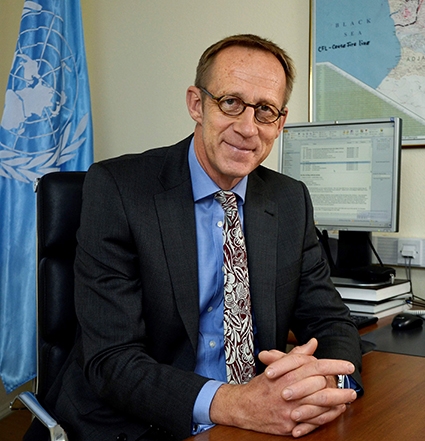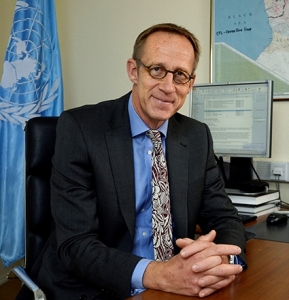Niels Scott: UN’s 70 Years Working to Make the World a Better Place
“The Former Secretary-General of UN, Dag Hammarskjold, said that the UN was not designed to take people to heaven but to prevent them from going to hell and I think he was very right to say this. We make sure that people are empowered to improve their lives.”- Niels Scott, UN Resident Coordinator in Georgia.
In 1945, representatives from 50 countries met in San Francisco at the United Nations Conference on International Organization to draw up the United Nations Charter. It was signed by those countries on June 26th 1945, but the Organization officially came into existence on 24 October 1945 when the Charter was ratified by China, France, the Soviet Union, the United Kingdom, the United States and by a majority of other signatories. The UN was created to prevent such devastating conflicts as World War II. Its aims are maintaining international peace and security, promoting human rights, fostering social and economic development, protecting the environment, and providing humanitarian aid in cases of famine, natural disaster, and armed conflict. United Nations Day has been celebrated on 24th October each year. Georgia Today met Niels Scott, UN Resident Coordinator and UNDP Resident Representative in Georgia, to speak about the achievements of the UN in Georgia and globally and the challenges it faces.
Q: Mr. Scott, exactly 70 years ago the United Nations was established in order to make the world a better place to live in. What has changed since its establishment?
A: Hopefully, it is actually a better place! The United Nations was set up to do three main things: one is ensure human rights, then peace and security and the third is development. Let’s take it one by one. We’ve recently seen unfortunate controversies over basic human rights in the Middle East. These shouldn’t become an exception to the rights in the world. I think people nowadays better understand what their rights are - right to education, right to free expression. All of these we enjoy here in Georgia. A number of countries where human rights were challenged before now see people demanding that they have freedom of assembly, freedom of expression, freedom of speech. It’s come a long, long way and, like everything that the UN supports, it has to come a long way before it reaches a point of perfection. Conflicts are taking place as we speak: every day we read the stories in the news and are sad to hear about such events as those in the Middle East, Afghanistan, where conflict still continues. The ability to mediate, to discuss, to try to limit the impact of these events is vital. Sometimes we (at the UN) feel powerless to prevent the conflict but we have never left the table- aiming at minimum to reduce the number of conflicts by encouraging the increase of time people take to discuss a solution. When we think of Georgia, we immediately think of the Abkhazia and Ossetia situation, which is very unfortunate, though we are working to find a solution. In terms of development in Georgia, we set ambitious goals to halve poverty, eradicate some of the key diseases and to make sure that illiteracy becomes a thing of a past. Recently, at the New York General Assembly, the sustainable development goals showed us ways to make sure that such development is seen right across the globe with no-one left behind- and this includes Georgia, which has enjoyed good solid economic growth. The United Nations is here to make sure that everybody benefits from these opportunities.
Q: How is it possible for everybody to enjoy the opportunities the UN offers?
A: The most important thing is to have peace, security and stability, on the basis of which you establish human rights. Next comes development. In Georgia the challenge is to first ensure security, by which I mean regional stability above all. Once we’ve done that then we can set to ensuring human rights. Another basic human right is women’s rights, including having equal opportunity in the political arena, in business and in society. Unfortunately, there is a certain stigma [in Georgia] that prevents women from enjoying such opportunities. We are working on it and will persevere. We see development around us yet we can still do more to make sure that everyone benefits from such things as a good education- education that gets jobs - and healthcare that maintains a good lifestyle.
Q: What about women living in the rural areas whose conditions are more exacerbated?
A: A child who lives outside of Tbilisi has four times the chance of dying within its first four months of life than a child in Tbilisi; double the probability of death within the next four months. This is huge barrier to development. The reason we’ve been supported the local government alongside the central government is because people need to have a voice. We want those in the high mountains to have the same life opportunity as somebody has in central Tbilisi and we can achieve that through people actually taking more responsibility for it. It requires the reallocation of resources and the UN in Tbilisi should be more careful in this as it is easy to advise somebody to reallocate resources but not necessarily so easy to do so- having resources is a challenge in itself and this should be recognized! But what’s more important is that people are actually given the opportunity in the rural areas and mountains and generally in Georgia to be able to say: “This is one of our priorities!” A little change, true, but still a change.
Q: The United Nations is celebrating its 70th anniversary and 20th in Georgia. What are its plans?
A: You are right to point this out. The fact that the UN has been in Georgia for twenty years is more important than the fact that Georgia’s been in the UN for twenty years. We’d like to get a good discussion of what it means for Georgia to get through its first twenty years and its second round of independence. How it relates to what happened in the world during the last 70 years and what Georgia has achieved is quite substantial. If we go back to the early 1990s we can be proud of what has been accomplished since. Georgia’s European approach is another aspect. I don’t mean aiming for tanks and guns, I mean what Europe can do in terms advocating for security and peace. By maintaining its close developing phase with Europe, Georgia increases security. Also notable is the very responsible approach which Georgia has taken to the discussion around Abkhazia and Ossetia. The Government of Georgia played an essential role in trying to encourage some kind of dialogue to reach a solution without provoking. Such actions have served to increase the security of the average Georgian. Yet it is natural to think of the great challenges that remain. Human rights have progressed but there sadly remain challenges in terms of peace and security. We would love to have a debate on what Georgia wants to achieve in the next five years, with all generations present- people of twenty and seventy years gathering together and asking each other: how do you see Georgia? What do you want? As for the UN, seventy- the age when a person would normally retire- is our time to consider what we have learnt during our time and to analyze how we’ve progressed. But one of the things we’ve learnt in our seventy years is that the United Nations is necessary, increasingly necessary. The Former Secretary-General of UN, Dag Hammarskjold, said that the UN was not designed to take people to heaven but to prevent them from going to hell and I think he was very right to say this. We make sure that people are empowered to improve their lives.
Meri Taliashvili












